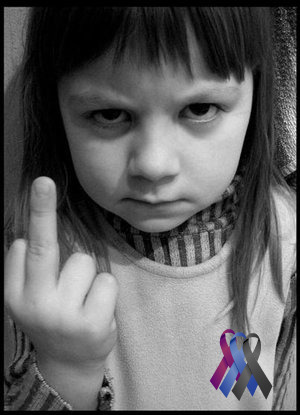Permalink
by Randi James
Psychological Theories on Why Mothers Are Alienating Kids from Fathers
Dear Reader,
If you're seeking a psychological theory, you may be better off asking Sylvia Browne (better yet, try this one) or your local astrologist. Psychology is NOT a science...it only has "ideas" about things. Richard Gardner, pro-pedophilic founder of parental alienation syndrome, wrote it best (emphasis mine):
"Psychodynamic psychiatry, to an even greater extent, psychoanalysis, is probably the most speculative of all the alleged scientific disciplines. In fact, it is reasonable to say that it is much more an artthan a science. We spin off the most fantastic explanations for human behavior and often come to believe our own delusions.
Although the concept of scientific proof may be of importance in such fields as chemistry, physics, and biology, the concept is not as applicable in the field of psychology; especially with regard to issues being dealt with in such areas as child-custody disputes, and sex-abuse accusations."Id. at 12.
But going back to the root of your inquiry, ask yourself, why might you alienate your own child from someone else? A grandparent or other family member, a friend. Matter of fact, take out the word alienate, because it has too many connotations in this false PAS climate right now.
Why might you keep your own child, or loved one, away from someone else?
Come on, you can come up with something....
Maybe because of that person's behavior, or how that person makes you or your child feel...right????
No theory required.
Here is a helpful list of characteristics of "y" person that may cause "x" person (and their child) to not want to be around them:
Angry
Abusive
Violent
Coercive
Controlling
Threatening
Intimidating
Demanding
Domineering
Harassing
Stalking
Tyrannical
Oppressive
Forceful
Manipulative
Deceptive
Unethical
Un-empathetic (Lacks Empathy)
Entitled
Immature
Self-centered
Neglectful
Guilt inducing
Pushy
Intentionally tries to humiliate
Harsh, rigid and punitive parenting style
Outrage at child’s challenge of authority
May use force to reassert parental position
Dismissive of child’s feelings and negative attitudes
Vents rage, blames mother for “brainwashing” child and takes no responsibility
Challenges child’s beliefs and/or attitudes and tries to convince them otherwise
Inept and unempathic pursuit of child, pushes calls and letters, unannounced or embarrassing visits
Read it from an adult who's parent exhibited some of these characteristics during her youth:http://americanchildrenunderground.blogspot.com/2009/09/domestic-violence-by-proxy-clarity-on.html
See Also: Maternal Deprivation
Thank you for reading. Good luck!
Related Posts :
protective mothers
- Imminent Danger Protective Measures Denied by Maricopa County Superior Court Judge Jose Padilla, in Arizona
- DHHS, Responsible Fatherhood, the Family Court: Your Tax Dollars Being Wasted On an Illegal Hype
- What's Happening in Our Family Court System and What Should Be Done?
- There WILL Be a Family Court System Audit in California
- Between a Rock and a Hard Place: The System Sends Mixed Messages to Abuse Victims
- Scott Roeder's Ex-Wife Insisted on Custody of Their Son
abusers
- Ms Hyde Gives Her Opinion of Me Based on One Post
- Between a Rock and a Hard Place: The System Sends Mixed Messages to Abuse Victims
- Male Caretakers are at Greater Risk to Cause Abusive Head Trauma
- An Abuser's Tactic: How One Father Used A Child Custody Dispute to Discredit Sexual Abuse
- Joint Custody and Parental Cooperation
- Suffering Suffragettes
psychological fraud
- What's Happening in Our Family Court System and What Should Be Done?
- I Love It When Muthafuckers Google Their Names...
- Failing to Report and Reporting to Fail
- Mothers Can't Win in a Patriarchal System--filled with "Custody Evaluators"
- Vicki Plant Was Appointed Guardian Ad Litem for My Child Sexual Abuse Case
- What the Mother's Act Really Means
parental alienation fraud
- Father's Rights and the War on Women and Children: They Can't Handle the Truth
- Survivors of Abuse React to Their Abusers in a Myriad of Ways
- Fighting PAS In California's Family Court: AB 612
- The DSM: A Sick Joke. How Far Will It Go?
- PAS is Real: Targeting NonCustodial Mothers
- The Infamous Pigg
on 9/24/2009
Labels: abusers, parental alienation fraud, protective mothers, psychological fraud
Technorati Tags: Psychological,Kids,Randi,James,Dear,Reader,theory,Sylvia,Browne,Psychology,science,ideas,Richard,Gardner,alienation,syndrome,emphasis,Psychodynamic,psychiatry,extent,psychoanalysis,fact,human,behavior,Although,concept,importance,biology,custody,inquiry,grandparent,member,friend,Matter,word,climate,Come,Maybe,person,Here,characteristics,Angry,Abusive,Violent,Coercive,Tyrannical,Oppressive,Forceful,Manipulative,Deceptive,Unethical,Empathy,Immature,Self,Neglectful,Guilt,Pushy,Harsh,Outrage,Dismissive,feelings,beliefs,Inept,pursuit,Read,parent,youth,violence,proxy,Also,Maternal,Deprivation,Thank,luck,Imminent,Danger,Protective,Measures,Maricopa,Superior,Court,Judge,Jose,Padilla,Arizona,DHHS,Responsible,Dollars,Illegal,Hype,System,Should,Audit,California,Rock,Hard,Place,Messages,Abuse,Victims,Scott,Roeder,Wife,Hyde,Opinion,Post,Male,Greater,Risk,Cause,Head,Trauma,Abuser,Tactic,Father,Child,Dispute,Discredit,Sexual,Joint,Parental,Cooperation,Suffragettes,fraud,Love,Muthafuckers,Google,Report,Fail,Patriarchal,Evaluators,Vicki,Plant,Guardian,Litem,Case,Mother,Means,Rights,Women,Children,Handle,Truth,Survivors,React,Abusers,Myriad,Ways,Sick,Real,NonCustodial,Infamous,Pigg,Sphere,Content,Theories,Fathers,explanations,delusions,areas,accusations,connotations,attitudes,CaretakersNote: Cross posted from [wp angelfury] A Human Rights Issue-Custodial Justice.
Permalink



 I used to think that the family court system was basically fair. That was before my childhood friend, Diane Hofheimer, asked me to consider doing a documentary on the family courts. She had taught herself the law so that she could work with her attorney husband, Charlie Hofheimer, in their Virginia law practice.
I used to think that the family court system was basically fair. That was before my childhood friend, Diane Hofheimer, asked me to consider doing a documentary on the family courts. She had taught herself the law so that she could work with her attorney husband, Charlie Hofheimer, in their Virginia law practice.